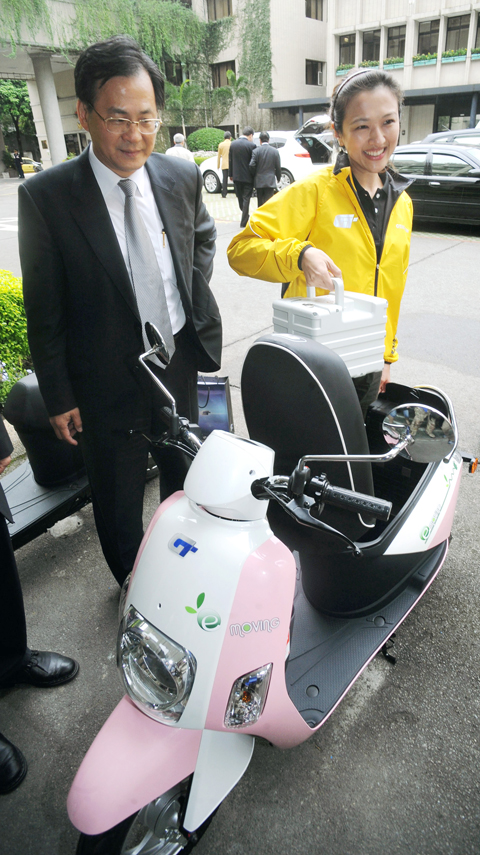The government yesterday unveiled its six-year plan to promote the electric car industry in two phases, with a projected total investment of NT$9.7 billion (US$294 million).
“The government will take the lead in fueling the uptake in the initial phase, which is usually the most difficult period,” Woody Duh (杜紫軍), director-general of the Industrial Development Bureau, told a press conference.
The first phase starts this year through 2013, with the government setting up the infrastructure, such as electric-battery refueling stations and 10 trial zones across the country. A total of 3,000 electric cars are expected to hit the road during this period.

PHOTO: WANG MIN-WEI, TAIPEI TIMES
Electric cars may also be exempted from a commodity tax for three years, if a proposed amendment passes its third reading at the legislature by June, Duh said, adding that county and city governments are also encouraged to cancel license fees.
For the second phase, the government will give out cash rebates to stimulate purchases, but the size of the subsidy would “depend on the outcome of trial operations and the government’s financial status at the time,” Duh said.
By 2016, the government aims to have local automakers producing more than 60,000 green automobiles, including 15,000 for export, Duh said.
“We aim to help Taiwanese automakers become one of the world’s top 10 electric car brands by then,” Vice Minister of Economic Affairs Lin Sheng-chung (林聖忠) said.
Lin rebuffed newspaper reports yesterday that the government was pushing only electric cars while ditching the adoption of electric motorcycles.
“Motorcycles are the most affordable vehicle for the public,” Duh said, adding that the Executive Yuan approved a plan to promote electric bikes in August last year.
The commodity tax for electric bikes has been slashed by half, and the government is subsidizing buyers cash rebates from NT$8,000 to NT$11,000 per bike up to 2012.
The government aims to have 160,000 electric bikes on the road by 2012, Lin said.

PERSISTENT RUMORS: Nvidia’s CEO said the firm is not in talks to sell AI chips to China, but he would welcome a change in US policy barring the activity Nvidia Corp CEO Jensen Huang (黃仁勳) said his company is not in discussions to sell its Blackwell artificial intelligence (AI) chips to Chinese firms, waving off speculation it is trying to engineer a return to the world’s largest semiconductor market. Huang, who arrived in Taiwan yesterday ahead of meetings with longtime partner Taiwan Semiconductor Manufacturing Co (TSMC, 台積電), took the opportunity to clarify recent comments about the US-China AI race. The Nvidia head caused a stir in an interview this week with the Financial Times, in which he was quoted as saying “China will win” the AI race. Huang yesterday said

Japanese technology giant Softbank Group Corp said Tuesday it has sold its stake in Nvidia Corp, raising US$5.8 billion to pour into other investments. It also reported its profit nearly tripled in the first half of this fiscal year from a year earlier. Tokyo-based Softbank said it sold the stake in Silicon Vally-based Nvidia last month, a move that reflects its shift in focus to OpenAI, owner of the artificial intelligence (AI) chatbot ChatGPT. Softbank reported its profit in the April-to-September period soared to about 2.5 trillion yen (about US$13 billion). Its sales for the six month period rose 7.7 percent year-on-year

Nissan Motor Co has agreed to sell its global headquarters in Yokohama for ¥97 billion (US$630 million) to a group sponsored by Taiwanese autoparts maker Minth Group (敏實集團), as the struggling automaker seeks to shore up its financial position. The acquisition is led by a special purchase company managed by KJR Management Ltd, a Japanese real-estate unit of private equity giant KKR & Co, people familiar with the matter said. KJR said it would act as asset manager together with Mizuho Real Estate Management Co. Nissan is undergoing a broad cost-cutting campaign by eliminating jobs and shuttering plants as it grapples

MORE WEIGHT: The national weighting was raised in one index while holding steady in two others, while several companies rose or fell in prominence MSCI Inc, a global index provider, has raised Taiwan’s weighting in one of its major indices and left the country’s weighting unchanged in two other indices after a regular index review. In a statement released on Thursday, MSCI said it has upgraded Taiwan’s weighting in the MSCI All-Country World Index by 0.02 percentage points to 2.25 percent, while maintaining the weighting in the MSCI Emerging Markets Index, the most closely watched by foreign institutional investors, at 20.46 percent. Additionally, the index provider has left Taiwan’s weighting in the MSCI All-Country Asia ex-Japan Index unchanged at 23.15 percent. The latest index adjustments are to